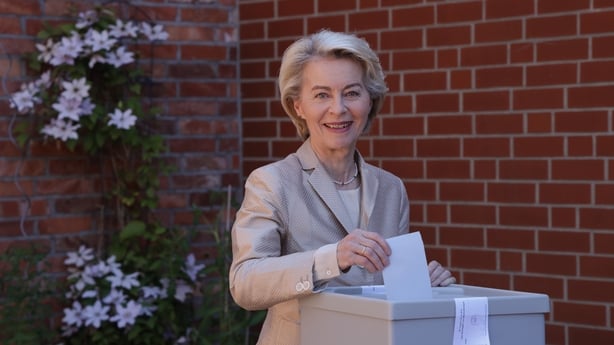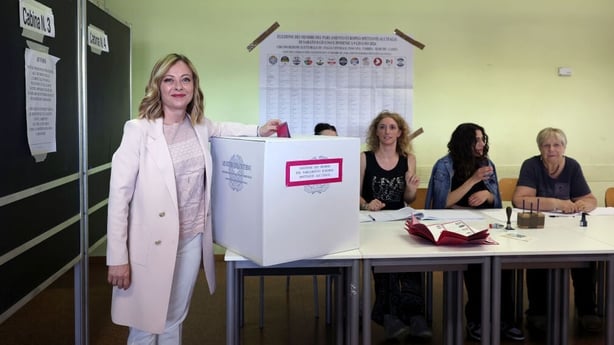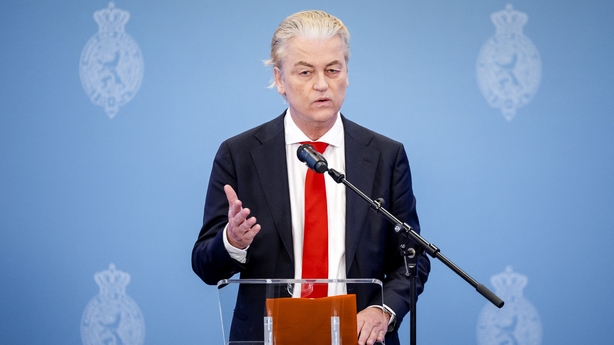The centre-right European People's Party (EPP) is projected to win 189 seats - the largest bloc - in the European Union Parliament, according to the latest projection published by the EU.
The Socialists and Democrats bloc was projected to come in second with 135 seats.
Far-right parties have also made gains in elections to the European Parliament, prompting French President Emmanuel Macron to call an election and adding uncertainty to Europe's future political direction.
While the centre, liberal and green parties are set to retain the balance of power in the 720-seat parliament, the vote dealt a domestic blow to the leaders of both France and Germany, raising questions about how the European Union's major powers can drive policy in the bloc.
Like Mr Macron, German Chancellor Olaf Scholz also endured a tough night where his Social Democrats scored their worst result ever, with the right-wing Alternative for Germany (AfD) making gains.
A rightwards shift inside the European Parliament may make it tougher to pass new legislation that might be needed to respond to security challenges, the impact of climate change or industrial competition from China and the United States.

However, exactly how much influence the euro-sceptic nationalist parties will wield will depend on their ability to overcome their differences and work together.
They are currently split between two different cohorts and some parties and politicians for now lie outside these groupings.
'Anchor of stability'
The EPP result is good news for EPP member Ursula von der Leyen who seeks a second five-year term at the helm of the EU executive arm.
"We are the anchor of stability," Ms von der Leyen told cheering supporters at the EPP's election night event in Brussels.
"No majority can be formed without the EPP and together ...We will build a bastion against the extremes from the left and from the right," she added.

However, Ms von der Leyen may still need support from some right-wing nationalists, such as Italian Prime Minister Giorgia Meloni's Brothers of Italy to secure a parliamentary majority, giving Ms Meloni and her European Conservative and Reformists (ECR) allies more leverage - which could upset other potential allies.
Ms Meloni's Brothers of Italy group won the most votes in this weekend's European parliamentary election, exit polls said, confirming its status as Italy's most popular party.
An exit poll for state broadcaster RAI said Brothers of Italy won between 26 - 30% of the vote, with the centre-left opposition Democratic Party (PD) coming second with 21- 25%
The other main opposition party, the Five-Star Movement, was seen on 10-14%, while Forza Italia, founded by Silvio Berlusconi, was in fourth place on 8.5 - 10.5%, potentially defeating its old ally, the far-right League, which was on 8 - 10%.
Spain's centre-right People's Party (PP) came out on top in the European election, garnering 22 seats out of the 61 allocated to the country, and defeating the Socialist-led government of Prime Minister Pedro Sanchez.
With 99% of ballots counted, the opposition PP won with 22 seats ahead of the Socialists with 20 seats, while the far-right Vox came in third with six seats.

The count of votes cast in Austrian polling stations and a projection for postal ballots confirmed the far-right Freedom Party won the European Parliament election but by less than had been forecast, national broadcaster ORF said.
The Freedom Party secured 25.5% of the vote, narrowly ahead of the conservative People's Party (OVP) at 24.7% and the Social Democrats at 23.3%, ORF said.
A polling-based forecast issued earlier had shown the Freedom Party with a 3.5% lead over the OVP.
In the Netherlands, which voted on Thursday, exit polls showed nationalist Geert Wilders' anti-immigration party was set to win seven of the 29 Dutch seats in the EU assembly, just one short of the combined seats of a Socialist Democrat-Greens alliance.
However, Slovak Prime Minister Robert Fico's party admitted defeat in EU elections to the opposition liberals, weeks after he was gravely wounded in an assassination attempt.
Mr Fico's left-wing nationalist Smer-SD party expressed "congratulations to the winner of the election, Progressive Slovakia" and its new European parliament members, on its Facebook page.
Many voters have been hit by the cost of living, have concerns about migration and the cost of the green transition and are disturbed by geopolitical tensions, including war in Ukraine.
In Hungary nationalist Prime Minister Viktor Orban stoked fears of the Ukraine war expanding to one between the West and Russia, criticising Brussels and NATO.
As he cast his vote he framed it as a "pro-peace or pro-war election".
But in eastern EU countries, the spectre of Russia's threat loomed large.
"I want security, especially for the Baltic states. And greater support for Ukraine to end the war," said Ieva Sterlinge, a 34-year-old Latvian doctor.
That message resonated in Poland too, where estimates said the pro-European coalition of Donald Tusk looked set to stave off an attempted comeback from nationalist former ruling party Law and Justice.
Projections from the EU parliament put Tusk's alliance on 38 percent, ahead of PiS on 33%.

